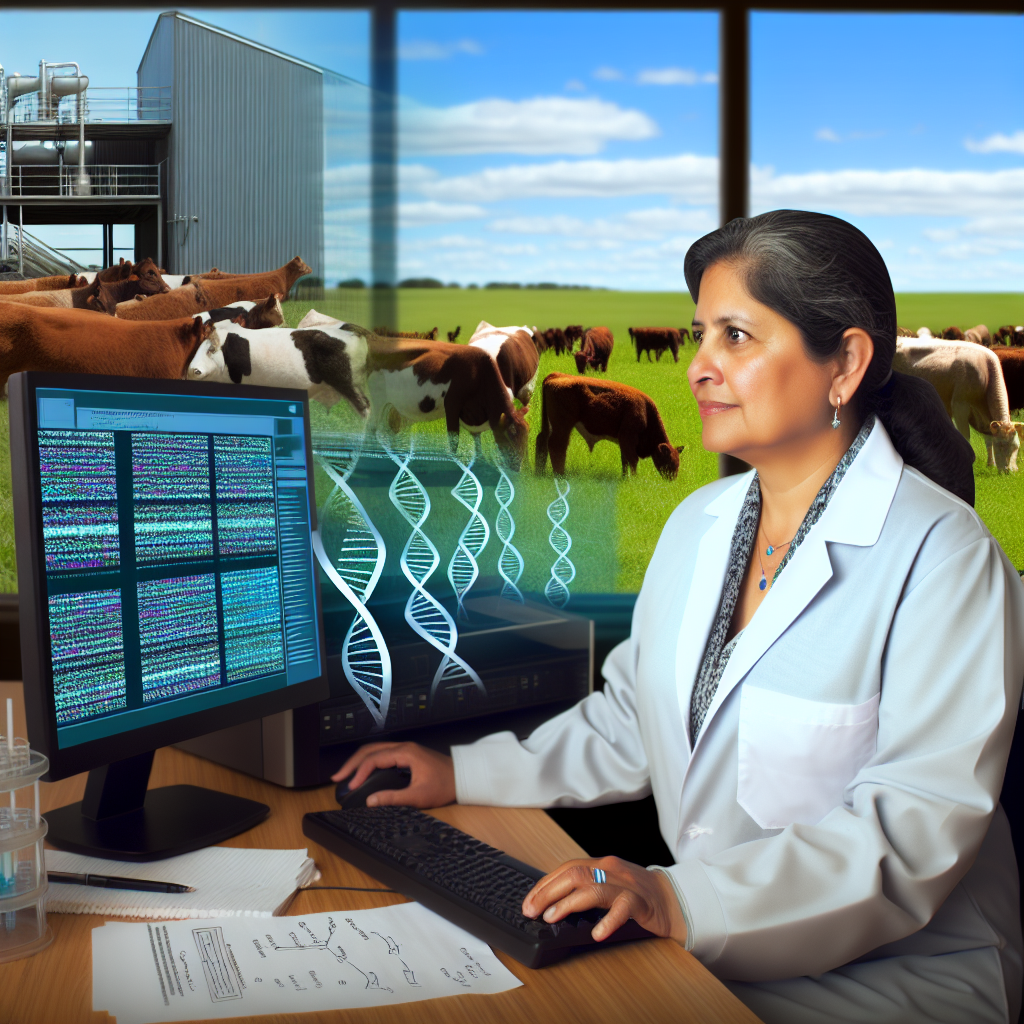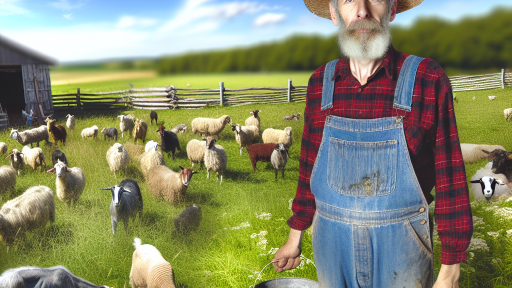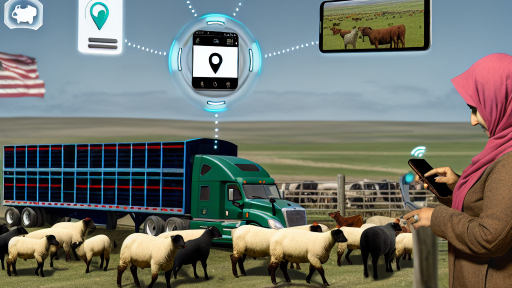Overview of Livestock Genetics
Definitions and Importance
Livestock genetics refers to the study of heredity in domesticated animals.
This field focuses on traits passed from parents to offspring.
It includes understanding genetic variations within species.
For instance, cattle can be bred for specific characteristics like milk production.
Animal genetics plays a crucial role in agriculture.
Improving livestock traits leads to better productivity.
Additionally, genetic advancements enhance animal health and welfare.
Key Concepts in Livestock Genetics
Several key concepts shape livestock genetics.
One important concept is selective breeding.
This process allows farmers to choose animals with desirable traits.
Next, genetic mapping helps identify specific genes affecting traits.
Moreover, genetic engineering introduces new qualities into livestock.
Benefits of Genetic Improvement
Genetic improvement offers numerous benefits for farmers.
- Enhanced growth rates and feed efficiency
- Increased disease resistance
- Higher quality meat and dairy products
These benefits contribute significantly to economic viability.
Furthermore, better genetics align with sustainable farming practices.
Transform Your Agribusiness
Unlock your farm's potential with expert advice tailored to your needs. Get actionable steps that drive real results.
Get StartedCurrent Trends in Livestock Genetics
The livestock industry is witnessing exciting trends in genetics.
Genomic selection is becoming increasingly popular.
This method uses DNA analysis to predict an animal’s genetic potential.
Additionally, advancements in biotechnology enhance breeding techniques.
For example, artificial insemination enables broader genetic diversity.
Understanding livestock genetics shapes the future of agriculture.
It allows farmers to produce healthier and more productive animals.
Key Genetic Traits Impacting Livestock Productivity
Growth Rate
Growth rate significantly affects livestock productivity.
This trait determines how quickly animals reach market weight.
Animals with favorable growth genes mature faster.
Consequently, producers can harvest meat sooner.
Genetic selection enhances growth rates in breeding programs.
Feed Efficiency
Feed efficiency is crucial for livestock profitability.
This trait measures how efficiently animals convert feed into body mass.
Higher efficiency reduces feeding costs.
Producers benefit from selecting animals with superior feed conversion ratios.
As a result, livestock requires less feed for the same weight gain.
Disease Resistance
Disease resistance plays a vital role in maintaining herd health.
Animals with strong immune systems thrive better in challenging environments.
This trait leads to lower veterinary costs and reduced mortality.
Genetic advancements enable breeders to select for disease-resistant traits.
Consequently, healthy livestock enhances overall productivity.
Reproductive Traits
Reproductive efficiency greatly influences livestock operations.
Traits such as fertility and calving ease are essential considerations.
Showcase Your Farming Business
Publish your professional farming services profile on our blog for a one-time fee of $200 and reach a dedicated audience of farmers and agribusiness owners.
Publish Your ProfileAnimals that breed consistently contribute to herd sustainability.
Moreover, rapid reproductive cycles improve overall herd turnover.
Genetic selection helps produce animals with superior reproductive performance.
Meat Quality
Meat quality directly affects consumer preference and market prices.
Traits such as marbling and tenderness enhance eating experiences.
Breeding for quality traits can attract higher market rewards.
Producers prioritize genetic factors that enhance meat attributes.
Ultimately, meat quality influences both economic and consumer outcomes.
Modern Breeding Techniques
Artificial Insemination
Artificial insemination (AI) plays a crucial role in livestock breeding today.
This technique allows farmers to use superior genetics from far-off locations.
It increases the genetic diversity and overall productivity of the herd.
Farmers can select traits that enhance growth rate and disease resistance.
Moreover, AI reduces the risk of disease transmission compared to natural breeding.
Efficient timing of insemination is essential for maximizing pregnancy rates.
Record keeping ensures that only the best-suited animals are bred.
In addition, proper training is necessary for those performing the procedure.
Benefits of Artificial Insemination
The advantages of artificial insemination are significant for modern farmers.
- It allows for the use of frozen semen, extending genetic reach.
- Outstanding sires can produce offspring without being physically present.
- AI minimizes transportation costs for breeding animals.
- This method allows for controlled breeding without keeping males on the farm.
Genetic Editing Techniques
Genetic editing is revolutionizing livestock breeding methods significantly.
Tools such as CRISPR enable precise modifications to the animal’s DNA.
This technology creates livestock with desirable traits, such as disease resistance.
Farmers can enhance feed efficiency and growth rates using genetic editing.
Additionally, genetic improvements can contribute to environmental sustainability.
As a result, livestock may require fewer resources while producing more meat or milk.
Challenges and Considerations
Despite its benefits, genetic editing also presents challenges that must be addressed.
Ethical concerns arise regarding the extent of genetic modifications.
Furthermore, regulatory frameworks vary between countries, complicating its use.
Public perception plays a crucial role in the acceptance of these technologies.
To foster trust, transparency in the breeding process is essential.
Collaboration between scientists, farmers, and regulators is key to success.
Gain More Insights: Genetic Tools for Enhancing Dairy Production
Assessing Genetic Diversity in Livestock Populations
Importance of Genetic Diversity
Genetic diversity is vital for livestock populations.
It enhances adaptability to changing environments.
Furthermore, it promotes better disease resistance.
Greater diversity contributes to improved productivity.
Methods of Assessing Genetic Diversity
Scientists use several methods to assess genetic diversity.
One common approach is DNA analysis.
This technique examines genetic variations among individuals.
Another method involves phenotypic analysis.
Phenotypes reveal observable traits that can indicate diversity.
Using Molecular Markers
Molecular markers are essential tools for evaluating genetic diversity.
Showcase Your Farming Business
Publish your professional farming services profile on our blog for a one-time fee of $200 and reach a dedicated audience of farmers and agribusiness owners.
Publish Your ProfileThey provide precise measurements of genetic variation.
Examples include microsatellites and single nucleotide polymorphisms.
These markers offer insights into population structure.
Environmental Adaptations
Genetic diversity also relates to environmental adaptations.
Livestock with diverse genetics can thrive in various climates.
This resiliency is crucial for sustainable farming practices.
Farmers can select animals better suited to their local conditions.
Applications of Genetic Diversity Assessment
Assessments can enhance breeding programs.
Breeders can select individuals with desirable traits.
This process leads to healthier and more productive livestock.
Moreover, it supports conservation efforts for endangered breeds.
Case Studies
Successful case studies demonstrate the benefits of genetic assessments.
In Brazil, genetic diversity evaluations improved cattle productivity.
Likewise, in the Netherlands, pig populations showed enhanced disease resistance.
These examples highlight the importance of genetic diversity.
Find Out More: Essential Tips for Exotic Livestock Care
Case Studies: Successful Genetic Programs in Cattle and Poultry
Advancements in Cattle Genetics
Genetic improvement in cattle has led to increased productivity.
Innovative breeding techniques are reshaping cattle farming.
For instance, the Beef Improvement Federation successfully increased marbling in cattle.
This program resulted in higher quality beef production.
Well-known rancher Linda Forsyth adopted genomic selection practices.
She selected sires based on genomic data, producing superior offspring.
Her herd has shown a significant increase in weight gain.
Additionally, farmers reporting similar practices saw better feed efficiency.
This not only improved profits but also supported sustainable practices.
Enhancing Poultry Production
Poultry genetics have also seen remarkable advancements.
Companies like Aviagen have pioneered selective breeding programs for broilers.
These programs focus on growth rate and disease resistance.
Farmers using these breeds report faster growth cycles and lower mortality rates.
Furthermore, the selection for feed efficiency reduces overall costs.
Studies show significant improvements in production per square meter.
In one case, Moore Farms increased annual yield by 25% with new genetics.
Such successes illustrate the potential of genetic programs in poultry.
Lessons Learned from Genetic Programs
Several key lessons emerge from these case studies.
Firstly, investment in genetic testing pays off significantly.
Farmers who leverage technology see substantial gains.
Secondly, collaboration with geneticists enhances program effectiveness.
These partnerships foster innovative approaches to breeding.
Lastly, continuous evaluation of genetic programs is vital.
Taking feedback from farmers leads to ongoing improvements.
Showcase Your Farming Business
Publish your professional farming services profile on our blog for a one-time fee of $200 and reach a dedicated audience of farmers and agribusiness owners.
Publish Your ProfileThese examples underscore the importance of genetic advancements.
They pave the way for a more productive and sustainable livestock industry.
Gain More Insights: Optimizing Livestock Transport for Farm Efficiency

The Role of Genomic Selection in Enhancing Livestock Traits
Understanding Genomic Selection
Genomic selection utilizes DNA information to improve livestock breeding programs.
This technique accelerates genetic progress by identifying desirable traits efficiently.
It allows breeders to make informed decisions based on genomic data.
Consequently, animals with superior genetic potential are chosen for reproduction.
Benefits of Genomic Selection
Genomic selection significantly increases the accuracy of predicting animal performance.
Breeders can focus on traits such as growth rate, fertility, and disease resistance.
Moreover, it reduces the generation interval, leading to faster genetic improvements.
This approach enhances overall productivity and profitability in livestock farming.
Implementation Strategies
To implement genomic selection, breeders first need to collect DNA samples from livestock.
Next, they analyze these samples to determine genetic markers associated with desired traits.
Using this information, breeders can select the most suitable animals for mating.
Regular evaluation and updating of genomic data are also crucial for ongoing improvement.
Challenges and Considerations
Despite its advantages, genomic selection presents several challenges.
For instance, the cost of genomic testing can be prohibitive for some farms.
Additionally, the interpretation of complex genomic data requires specialized knowledge.
Breeders must also consider the ethical implications of genetic manipulation.
Future Directions
The future of genomic selection in livestock looks promising.
Ongoing advancements in technology will improve genetic testing efficiency.
Furthermore, collaboration among researchers, breeders, and industry stakeholders will enhance methodologies.
As a result, we can expect more sustainable and productive livestock systems.
Learn More: Selecting the Right Breeds for Your Farm
Ethical Considerations in Genetic Modification of Livestock
Understanding Genetic Modification
Genetic modification alters the DNA of organisms.
This technology allows for the introduction of desirable traits.
Such traits can include disease resistance and improved growth rates.
Farmers increasingly use genetic modification to enhance livestock productivity.
Potential Benefits
Genetic modification can lead to higher yield outputs.
Additionally, it can reduce the need for antibiotics in livestock.
These modifications also help in adapting to climate changes.
Furthermore, they can improve feed efficiency.
Ethical Concerns
Ethical concerns arise with genetic modification practices.
Animal welfare is a significant aspect of these discussions.
Some argue that genetic modifications may harm animal well-being.
Others express concerns about the naturalness of modified animals.
Moreover, long-term effects on ecosystems remain largely unknown.
Regulatory Frameworks
Regulations play a crucial role in genetic modifications.
Governments set guidelines to ensure the safety of modified organisms.
These guidelines aim to protect both consumers and the environment.
Showcase Your Farming Business
Publish your professional farming services profile on our blog for a one-time fee of $200 and reach a dedicated audience of farmers and agribusiness owners.
Publish Your ProfileStakeholders must navigate these regulations carefully.
Public Perception
Public opinion on genetic modification varies widely.
Some consumers view it positively, associating it with innovation.
Conversely, others are skeptical, fearing potential risks.
Engaging the public in discussions can help address concerns.
Future Directions
The future of genetic modification in livestock is promising.
Innovation could lead to more sustainable farming practices.
However, it requires careful attention to ethical considerations.
Collaboration among scientists, farmers, and ethicists is essential.
Future Trends in Livestock Genetics and Their Potential Impact
Emergence of Genomic Selection
Genomic selection revolutionizes livestock breeding practices.
This process utilizes DNA markers to enhance desirable traits.
Consequently, farmers can achieve faster genetic progress.
Moreover, it reduces the time needed for traditional breeding methods.
Integration of Artificial Intelligence
Artificial intelligence improves decision-making in livestock genetics.
Advanced algorithms analyze vast datasets for genetic traits.
As a result, producers can select animals with optimal characteristics.
Furthermore, AI tools enable real-time tracking of breeding outcomes.
Focus on Disease Resistance
Future genetics research emphasizes increasing disease resistance.
Breeders aim to develop livestock that withstands common illnesses.
This strategy enhances animal welfare and reduces veterinary costs.
Consequently, healthier livestock leads to increased productivity.
Climate Adaptation Strategies
Livestock breeds are evolving to adapt to climate change.
Breeders prioritize traits that enhance heat and drought tolerance.
Such adaptations ensure sustainability in changing environments.
Additionally, they maintain productivity levels during extreme weather events.
Sustainable Breeding Practices
Sustainable breeding practices are gaining traction globally.
These practices focus on minimizing environmental impacts.
Farmers increasingly adopt strategies that enhance genetic diversity.
Consequently, livestock populations become more resilient to diseases.
Collaboration with Biotechnology Firms
Collaboration between farmers and biotech firms is on the rise.
These partnerships leverage cutting-edge technology for breeding programs.
As a result, they develop superior livestock with desired characteristics.
Moreover, this synergy boosts productivity and economic viability.
Global Regulatory Developments
Upcoming regulatory changes will influence livestock genetics practices.
Governments are considering frameworks for genetically engineered animals.
These regulations aim to ensure food safety and welfare standards.
Consequently, producers must navigate evolving legal landscapes.
Consumer Preferences and Market Demand
Consumer preferences increasingly drive livestock genetics advancements.
Shifts towards sustainable and ethically produced meat influence breeding goals.
As a result, breeders focus on traits that align with market demand.
Showcase Your Farming Business
Publish your professional farming services profile on our blog for a one-time fee of $200 and reach a dedicated audience of farmers and agribusiness owners.
Publish Your ProfileFurthermore, responding to consumer trends supports industry growth.
Additional Resources
Cows and Climate Change | UC Davis
How Dairy Milk Has Improved its Environmental and Climate Impact …




